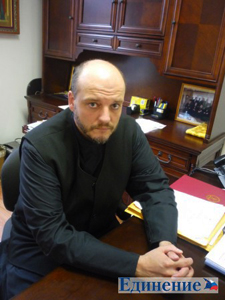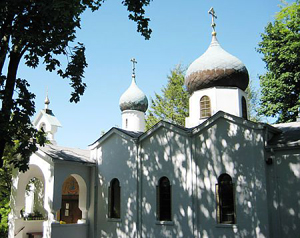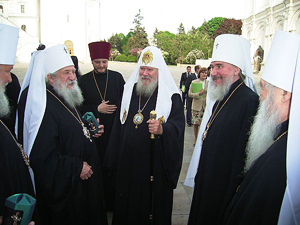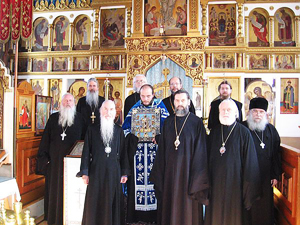
Protopriest Serafim Gan, Personal Secretary of the present First Hierarch of the Russian Orthodox Church Outside of Russia, His Eminence Metropolitan Hilarion, and of his predecessor, His Eminence Metropolitan Laurus, never suspected the role he was to play in the process of reestablishing the lost unity within the Russian Church. �
Born in California, he grew up in the diocese ruled by Archbishop Anthony (Medvedev), a great spiritual friend and hero of Vladyka Laurus and a hierarch of the old �Anthonite� school who was tonsured by Metropolitan Anthony (Khrapovitsky). Archbishop Anthony began his monastic life in Milkovo Monastery, a monastery that had given the Russian Church Abroad ten hierarchs, including St John of Shanghai.
Fate was to lead Fr Serafim to serve in the church founded by his grandfather, and now to be the rector of a parish founded by the spiritual father of his mother. The church is dedicated to St Seraphim of Sarov, the heavenly protector of Fr Serafim.
�
 - Fr Serafim, you serve in a church built on American soil dedicated to St Seraphim of Sarov, who is revered by Russians in the Homeland and abroad��
- Fr Serafim, you serve in a church built on American soil dedicated to St Seraphim of Sarov, who is revered by Russians in the Homeland and abroad��
- Long Island, in New York State, where our church is located, has a large Russian colony. People long for Russia, and find her in our churches.�
We have parishioners from Morocco, Paris, descendants of old emigres and many new emigres. On Pascha night I noticed that some 70 percent of the people in attendance were newly arrived. Our churches here have become Orthodox missions of Russia: here people feel at home, they find peace and consolation. �
People are being �churchified,�� they find the support they need to live in the difficult conditions of a foreign land. �
Our parish was established by a good pastor, Bishop Mitrofan (Znosko-Borovsky, +2002). He began his priestly service in Brest, then found himself in Morocco, where my mother grew up. She remembered him well�her first confession was made to him. �
I am glad that at the beginning of my priestly career I came to know my family from Harbin [China�transl.], and later learned about the places my mother remembered.�
I found myself in this parish unexpectedly. The position of rector became vacant, and Vladyka Laurus asked me to temporarily minister to its parishioners. �
In January, 2005, a feast day of St Seraphim, I came to perform services there. Since then, the parish has become like a family to me. This is very important, because if you view your parish as a family, then you come to respect them, and care for them. If conflicts arise, then, just as in a family where the members do not cease to love each other, parishioners will likewise tolerate flaws and love each other to the end. Then the parish holds together. I immediately sensed this familial spirit. ��
�Bear ye one another's burdens,� said Apostle Paul, �and so fulfil the law of Christ.� The parish should strive for this. If the whole parish bears one another�s burdens and fulfills the law of Christ, this would be the best witness to Orthodoxy and Christianity in general. Then people will feel comfortable and come to church. Christ said �By this shall all men know that ye are my disciples, if ye have love one to another.� And this love must be cultivated in people, it must be encouraged and supported.�
Our parish supported the process of achieving unity with the Russian Orthodox Church from the very beginning. They understood when I needed to leave for meetings, and of course, they supported Vladyka Laurus in his service. �
- Fr Serafim, your spiritual growth began, one might say, with the blessing of your eminent grandfather, Protopriest Rostislav Gan, renowned in China and Australia� �
Fr Serafim, your spiritual growth began, one might say, with the blessing of your eminent grandfather, Protopriest Rostislav Gan, renowned in China and Australia� �
- My grandfather, Protopriest Rostislav Gan, was born in 1911 on the China-East Railroad. Graduating from Harbin Polytechnical Institute, he was ordained to the priesthood and served in Shanghai together with the future saint, Bishop John (Maximovich).�
He was of one spirit with Vladyka John. My grandfather was interested in Church history, the works of the Holy Fathers, he corresponded with the monks of Mt Athos and was himself partial to the monastic life: he often celebrated Divine Liturgy, partook of the Holy Gifts of Christ, and led an ascetic life. When he was transferred to Harbin, he parted with Vladyka John, who often said that he lost a bit of his heart then. �
Soon, my grandfather and his family moved to Australia, at the same time that many Russians were leaving the USSR. Among them was my grandfather�s cousin, Archbishop Yuvenaly (Kilin, +1958). In Harbin, he was the rector of the Mother of God Men�s�Monastery, he headed the publishing concern, and was editor-in-chief of the Orthodox journal Khleb Nebesniy, �Bread of Heaven.� At the time, there were many monks at the monastery. Among them were podvizhniki renowned for their foresight: Schema-Abbots Ignatii and Seraphim and Schema-monk Mikhail. �
Archbishop Yuvenaly was given the Izhevsk cathedra. Interestingly, even in the 1950�s he had good relations with the [communist] Deputy for Religious Affairs.�
Vladyka Yuvenaly loved to perform divine services, and to preach. Vladyka traveled to parishes a great deal and the Deputy did not stop him. They said that he even had a lampada burning in before an icon, and that Vladyka Yuvenaly had a good influence on him and persuaded him that God exists and affects our lives. �
When Vladyka Yuvenaly died, they found his will, in which he requested to be buried under the left wing of Izhevsk Cathedral and that the wing be consecrated in the name of St John the Theologian. But the new bishop decided to consecrate it in the name of another saint. The Deputy, incensed by this, managed to have that bishop removed. �
- What was the fate of your grandfather, Fr Rostislav, in Australia? �
- Fr Rostislav built a cathedral in honor of the Protection of the Most-Holy Mother of God in a suburb of Sydney, Cabramatta, which was painted with frescoes in the ancient Russian style. He ministered a great deal to youth, especially those Russians whom he sponsored to come from China to Australia, and was the president of a committee to help Russian refugees.�
A huge home for seniors was built at the church with 200 cots, which exists to this day; he organized theological discussion groups, pastoral courses, and spent a great deal of energy tending to the education and training of the next generation of clergymen. Almost all of those priests who serve in Australia today were sent by Fr Rostislav to Holy Trinity Seminary in Jordanaville, NY. Grandfather also wrote articles on liturgical topics, and Vladyka Laurus, at the time heading the Jordanville printing house, would print them in Pravoslavnaya Rus� [Orthodox Russia�transl.] and published his book on the church ustav [rule--transl.]. In this way, our family already came to know the future Metropolitan Laurus. �
When I began studies at the Seminary, Vladyka Laurus gave me a missionary task: he had me send religious literature to Russia. �
Many reporters would ask me when the process of reestablishing unity began. In my opinion, on our part it began when Vladyka Laurus printed books in Jordanville and sent them to Russia. We would send the book by St Theophan the Recluse, Analysis of Holy Scripture and other books beneficial to the soul. �
Vladyka Laurus always took care to provide literature to those who could not find it themselves. �
I graduated Seminary in the rank of deacon, and I was sent to serve at the cathedral in Chicago, and a half a year later, at the request of the parishioners of my late grandfather, I was given blessing to go to Australia already in the rank of priest. �
I was 21 years old, and accepted my assignment with a great deal of fear. I feared pastoral service, but I was consoled by the words I found in my grandfather�s diary: �One must hear out a person completely, then give them words of consolation. The main thing is not to judge anyone, not push them away but support them.� Also, the words of St Nicholas of Japan: �One must first conquer love, then carry the word.� One must first establish good relations, come to love one�s parish, and only then bear the word of Christ.�
These thoughts calmed me and guided my service in one of the largest parishes of the Church Abroad.�
- What is most memorable to you about the Australian Diocese?�
In my opinion, the Australian Diocese is the most prayerful diocese of the Russian Diaspora. We often conducted divine services, parishioners often made confession, partook of Communion, and preserved all the pious traditions. �
Weddings were celebrated for three days: matrimony was performed on Friday, on Saturday and Sunday they would invite the guests, though they did not miss Sunday services. This is very heartwarming: Russian people moved to China, and then, in the 1960�s and 1970�s, to Australia, and lived the Russian church life there. �
A great deal had changed in Russia at the time, but they lived the old life, as their parents and grandparents had. Every parish there was a virtual piece of old Russia. It was fascinating, and I was constantly being enriched with new knowledge. �
�
I served in Australia until 2001, when Vladyka Laurus became the First Hierarch and called me to serve as his secretary. �
 - Fr Serafim, already then, in the early 2000�s, would you hear from Vladyka Laurus of his desire to restore unity between the Church Abroad and the Church in the Fatherland?�
- Fr Serafim, already then, in the early 2000�s, would you hear from Vladyka Laurus of his desire to restore unity between the Church Abroad and the Church in the Fatherland?�
At the time, Vladyka Laurus already made the firm decision that it was time to restore unity within the Russian Orthodox Church.�
I remember the first measure taken after the Metropolitan met with Vladimir Putin. This was the All-Diaspora Pastoral Conference held in Nyack in December 2003. This was the first project that Vladyka assigned to me; it was the beginning of the dialog with the Russian Orthodox Church. Before the opening of this conference, Vladyka told me that this is the will of God for the Russian Church, for us all to be together. And four years later, the Act of Canonical Communion was signed. �
Those were difficult years, and I saw that this process drew out all the �juices��of Vladyka Laurus. After the signing of the Act, he began to fade. In fact, for the sake of unity, he sacrificed his health, his life.�
- That is, the pressure from the opposition and attacks were so great?�
- Everything was exceedingly complicated. The Metropolitan was attacked, both clergymen and laypersons were rude to him. Yet many of those who were opposed at the time no longer doubt the benefit of unity. People understood that in order to remain Russian, it was necessary to maintain living, stable bonds with good forces in Russia. If the process of rebirth passed us by, this would have been a great sin, because we would have been turning away from Russia, from those positive changes which are occurring there. We absolutely must insert ourselves into this process and enrich ourselves spiritually and intellectually through contact with Russia.
�
- Despite the earlier division, Vladyka Laurus had traveled extensively throughout Russia��
- He traveled incognito, and of all the active figures of the Church Abroad he understood Russia more than anyone, because during his numerous visits, he did not avoid meeting or talking to representatives of all types of people.
��
When we were in Diveevo Convent, at the relics of St Seraphim, Vladyka was welcomed by the local nuns, and he, in his own laconic way, told them how the veneration of this saintly elder supported Russian emigres in Germany during the years of strife. Many miracles had occurred through the prayers of St Seraphim.�
Vladyka also visited places connected with the memory of the Royal Family. He did not display any emotions, but it was visible to me what a joy it was for him to pray at those sites. �
Vladyka Laurus visited Pochaev, went to the holy places in Ukraine. There he met Metropolitan Onoufry of Chernovitsa and Bukovino. I think that they immediately felt a kinship, because both possessed a genuine monastic spirit. They did not speak of the division; they spoke of monasticism, and prayer. I saw Vladyka Onoufry beaming with joy as they spoke, for he saw in Vladyka Laurus a kindred spirit. Despite the fact that Metropolitan Laurus lived in America, he viewed him as a Russian hierarch and monk first and foremost.�
I remember even before my arrival to the US from Australia that I had the opportunity to attend a Patriarchal service in Moscow. When I came to His Holiness Patriarch Alexy II for blessing, His Holiness said to me that if Vladyka Laurus becomes Metropolitan, we could then resolve many issues, that �we can work with him; they know him in Russia.��
�
- Fr Serafim, you decided to fresco the church and dedicate the images to the restored unity of the Russia.�
The notion to paint frescoes in the church originated when Metropolitan Laurus died, because we wished to preserve his memory and the memory of the great deed to which he devoted his life. Soon afterwards, His Holiness Patriarch Alexy II died. So the painting of frescoes in the church will be dedicated to those who restored unity and those who helped show us the true path. Also, it will display the history of the Russian Church; this history will be depicted beginning with the Baptism of Rus� until the historic reunification of the Russian Church. �
The first phase of the frescoes is complete, we plan on consecrating the altar portion in August. That section depicts saints connected with the memory of those people thanks to whom reconciliation occurred: St Alexei of Moscow, Holy Martyr Laurus, and the heavenly protectors of the fathers who took a sober approach to our division and never considered the Church in the Fatherland to lack grace�Metropolitan Anthony (Khrapovitsky) of blessed memory and Metropolitan Anastassy (Gribanovsky). On the basis of their statements and their teachings on the Church, we were able to find the proper path to unity. ��
 For instance, when in the 1950�s they were discussing the glorification of St John of Kronstadt by the Church Abroad (even Orthodox Serbs appealed to our Synod with this request), Metropolitan Anastassy replied that �we are only a part of the Russian Church and do not have the right to perform such acts.� �
For instance, when in the 1950�s they were discussing the glorification of St John of Kronstadt by the Church Abroad (even Orthodox Serbs appealed to our Synod with this request), Metropolitan Anastassy replied that �we are only a part of the Russian Church and do not have the right to perform such acts.� �
Also, certain statements by Hieromartyr Metropolitan Kirill (Kazansky) helped both sides find the true path to unity.��
We hope that when the frescoes in our church are completed, it will become a memorial church to the reestablishment of unity within the Russian Church. I consider this very important, because in unity, the aspirations of many people on various continents, people who awaited the rebirth of Russia, her emancipation from the godless regime, were fulfilled. �
The frescoes are being painted by Priest Pavel Akmolin, a student of renowned iconographers of the Russian diaspora, Archimandrite Kyprian (Pyzhov) and Hieromonk Andrei (Erastov). I like Fr Pavel�s style: the faces he depicts remind one of those painted by St Andrei Rublev, they are soft, kind. It is easier for contemporary man to pray before such images, in my opinion, they give one hope. �
- It has been two years since we lost Metropolitan Laurus. Fr Serafim, what is it first and foremost that your heart preserves of the memory of your Abbot?�
- His prayerful character, the light which he poured upon everyone he met. �
What always made a strong impression on me was that Vladyka Laurus accepted everything as a gift from God, he took everything as coming from the kind, loving hand of God which always leads to good. This was his attitude towards events in his personal life, his service, in the monastery�all was a gift from God. And when things were difficult for him, when he was attacked as a result of the reconciliation talks, the signing of the Act, he took all of it as a gift. Even some of those whom he loved, whom he knew from their childhood turned away from him, and he accepted this calmly, like a gift from God.�
He always recalled the words from the pannikhida, which I had never really thought about: �Thou only Creator Who, with wisdom profound, mercifully orderest all things, and givest that which is useful to all men,� that is, the Lord with profound wisdom orders the life of man and his salvation, as He orders the life of the Church and our service to the Church�with deep wisdom and love. That is why he accepted everything with faith in Divine Providence, he was always calm, one sensed his inner peace. �
I wouldn�t say the Vladyka would not worry or sense his colossal responsibility for the Church. But when others become irritated and begin to grumble, spread rumors and go against each other, he accepted everything as being the will of God. And if such is the will of the Lord, then it is good and salvific for us. It will become much easier for us to live if we accept things that happen in our lives and believe that over us is the firm hand of the Lord, as Apostle Peter said. St Seraphim would also speak of acquiring the spirit of peace, from whom thousands around us would be saved. Vladyka Laurus acquired that spirit of peace, and restored peace in the Church, as a result of which thousands are now being saved. But this salvific step of restoring brotherliness, unity and peace required enormous courage, abundant love. And everyone merged with this stream of love as a result of the reestablishment of unity.
�
Tatiana Veselkina, New York
unification.net.au